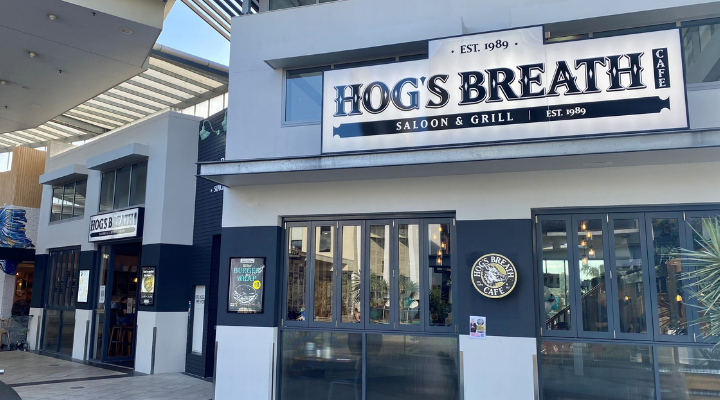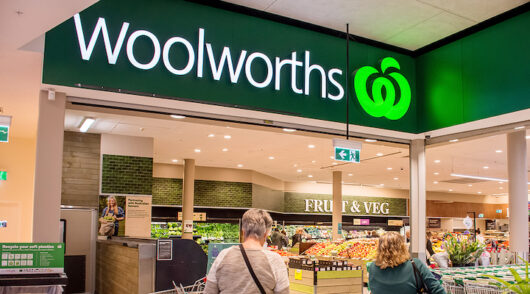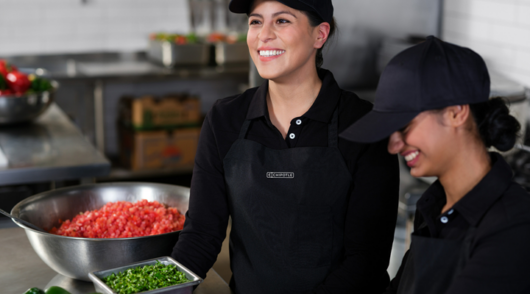Hog’s Breath Cafe is looking to rebuild its restaurant footprint, and has plans to open another 20 restaurants by 2029.
CEO Steven Spurgin told Franchise Executives reaching the milestone will depend on the economy and any external financing.
“Right now we are negotiating with financial partners for us to expand faster,” Spurgin said. “We have investors willing to fund building projects, enabling franchisees to join without needing upfront capital to build a restaurant.”
It typically costs about $800,000 to invest in a Hog’s Breath restaurant.
Spurgin believes greater franchisor flexibility will deliver what franchisees, and customers, need.
He has a number of growth solutions, including opening corporate stores with a plan to franchise them once established. Another solution is to adjust the large restaurant footprint, bringing in 300sqm restaurants (including the kitchen space) and turning tables over instead of having just one sitting.
“We will build restaurants the right size to suit the market. The strategy is for franchisees to break even without having to do 2000 covers on a weekend and school holidays,” he says.
New look, smaller restaurants
Hog’s Breath has been quietly rolling out a smaller format store with a lighter design and mature branding as part of a broader strategy to reignite the brand celebrating its 35th anniversary.
The first site to adopt the fresh look opened in Cairns as a company-owned restaurant. Since then a number of Queensland restaurants followed suit and a brand-new restaurant in Mandurah will showcase the new design in Western Australia when it opens late 2024.
“Our restaurants have been rebranding, maintaining that eclectic feel, just lighter and more spacious. We still have the paraphernalia customers associate with Hog’s but done tastefully,” says Spurgin.
“We value the hogster as a mascot for community events rather than the brand itself,” he says.
Spurgin is wary of pushing an aggressive rebranding of the restaurants.
“We want franchisees to stay with us. Franchisee tenure is on average about 15 years, that’s phenomenal staying power,” he says.
Hog’s Breath growth strategy
“The fact we are here shows the real power of the name in the market. Under the previous management the brand got confused and we lost our way.”
Spurgin said “The brand had struggled; it closed 19 restaurants in 2019. No-one notices the ownership, they notice their local restaurant closing down.”
In 2020 HBCA sold the franchise business back to Hog’s Breath Cafe owners Don Algie and Ginger White operating as HBC Management. Algie and White appointed Spurgin as CEO.
The overarching strategy is to reposition the brand by going back to its core principles.
“Our core values are looking after people with genuine care. We provide full table service, and attention from the owner of the restaurant.”
Hog’s Breath splits bills without question, can seat large groups of diners, has an extensive menu including dietary alternatives, and a strong loyalty program.
New IT systems
The chain has introduced new tech systems that benefit customers and franchisees, says Spurgin.
“Most IT systems can’t deal with split billing. We have costs assigned to one seat. Redcat has given us a bespoke offering that accommodates our loyalty program and per seat ordering,” he reveals.
The system is rolling out now and will be across all restaurants by November. It is fully integrated with back of house, across wages, rostering, and food cost management.
Hog’s Breath’s loyalty program with third party benefits rejects discounts in favour of showcasing the advantages of dining at the restaurant chain.
“What we’ve endeavoured to do is re-establish it not as a cheap destination but a specialist restaurant offering value for money,” says Spurgin.
“In our demographic, pubs and clubs have reinvented themselves. But our biggest competition is themed family restaurants – Italian, Korean, Greek. They do what we do, and we want to be known as the Australian restaurant.
“We’re focusing our efforts to define it. There is something for everybody; it’s quite an extensive menu, high quality food, and no extra pricing for extra sides.
“We’re delivering what Australians have forgotten about; we’re told labour is too expensive, but that’s our intangible point of difference,” he said.
This story was originally published on Franchise Executives.






